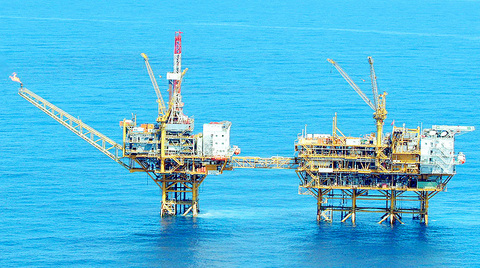Japan said yesterday that China has started production of gas or oil in a disputed energy field in the East China Sea where Chinese warships were recently spotted, and it would consider countermeasures.
Japanese officials have spotted flames spouting out of a Chinese drilling facility just on China's side of what Japan says is a dividing line in the potentially lucrative field. China does not recognize the line.
"We are not sure whether it is oil or gas. But we have confirmed that they have finally started digging," Economy, Trade and Industry Minister Shoichi Nakagawa told a news conference.

PHOTO: AFP
"The government is coordinating to consider ways to deal with this. The facility is located in the area of the dispute, although it is not clear whether the gasfield crosses the median line," he added.
Japan says that China, even if it digs from its side, could extract Japanese resources underground. It wants an agreement between the two countries before either starts extraction.
China and Japan, whose relations have worsened this year, have repeatedly protested to each other over the disputed field. But a series of high-level meetings has led to no agreement other than to continue dialogue.
In Beijing foreign ministry spokesman Qin Gang (
Qin told reporters that China's East China Sea drilling was within its rights.
"China's exploration in the gas field is being conducted in uncontested waters," he said.
However, Qin said, China was willing to conduct talks with Tokyo on the drilling question.
"The principle of the Chinese side is that we hope that the issue between China and Japan in the East China Sea can be handled by dialogue and negotiation," he said.
Nakagawa said he hoped Japan and China would resume dialogue on the issue. Qin said only that arranging the next round "requires further contact and consultations by the two sides."
Japan said Chinese warships were seen near the gasfield for the first time on Sept. 9, two days before Japan's general election. China said they were on a routine drill.
China began test-drilling unilaterally in the East China Sea in 2003. Japan accuses Beijing of reaching into Tokyo's exclusive economic zone, and in July the government for the first time granted a Japanese firm permission to explore the area.
A Japanese survey in 1999 estimated that the disputed field held a massive 200 billion cubic meters of gas.
The gas dispute stems from a disagreement over which sea resources the two sides can claim in the East China Sea, which separates China's eastern coast and Japan's southern island chain of Okinawa.
Under the UN Convention on the Law of the Sea, coastal countries can claim an economic zone extending 200 nautical miles (370km) from their shores. Both Japan and China signed the treaty, but the UN has until May 2009 to rule on the claims.
China also bases its claim on a separate international treaty that lets coastal countries extend their borders to the edge of the undersea continental shelf.
Japan and China, two of the world's biggest energy importers, have also clashed over securing priority to an oil pipeline being built in Russia.

The Burmese junta has said that detained former leader Aung San Suu Kyi is “in good health,” a day after her son said he has received little information about the 80-year-old’s condition and fears she could die without him knowing. In an interview in Tokyo earlier this week, Kim Aris said he had not heard from his mother in years and believes she is being held incommunicado in the capital, Naypyidaw. Aung San Suu Kyi, a Nobel Peace Prize laureate, was detained after a 2021 military coup that ousted her elected civilian government and sparked a civil war. She is serving a

REVENGE: Trump said he had the support of the Syrian government for the strikes, which took place in response to an Islamic State attack on US soldiers last week The US launched large-scale airstrikes on more than 70 targets across Syria, the Pentagon said on Friday, fulfilling US President Donald Trump’s vow to strike back after the killing of two US soldiers. “This is not the beginning of a war — it is a declaration of vengeance,” US Secretary of Defense Pete Hegseth wrote on social media. “Today, we hunted and we killed our enemies. Lots of them. And we will continue.” The US Central Command said that fighter jets, attack helicopters and artillery targeted ISIS infrastructure and weapon sites. “All terrorists who are evil enough to attack Americans are hereby warned

Seven wild Asiatic elephants were killed and a calf was injured when a high-speed passenger train collided with a herd crossing the tracks in India’s northeastern state of Assam early yesterday, local authorities said. The train driver spotted the herd of about 100 elephants and used the emergency brakes, but the train still hit some of the animals, Indian Railways spokesman Kapinjal Kishore Sharma told reporters. Five train coaches and the engine derailed following the impact, but there were no human casualties, Sharma said. Veterinarians carried out autopsies on the dead elephants, which were to be buried later in the day. The accident site

‘NO AMNESTY’: Tens of thousands of people joined the rally against a bill that would slash the former president’s prison term; President Lula has said he would veto the bill Tens of thousands of Brazilians on Sunday demonstrated against a bill that advanced in Congress this week that would reduce the time former president Jair Bolsonaro spends behind bars following his sentence of more than 27 years for attempting a coup. Protests took place in the capital, Brasilia, and in other major cities across the nation, including Sao Paulo, Florianopolis, Salvador and Recife. On Copacabana’s boardwalk in Rio de Janeiro, crowds composed of left-wing voters chanted “No amnesty” and “Out with Hugo Motta,” a reference to the speaker of the lower house, which approved the bill on Wednesday last week. It is